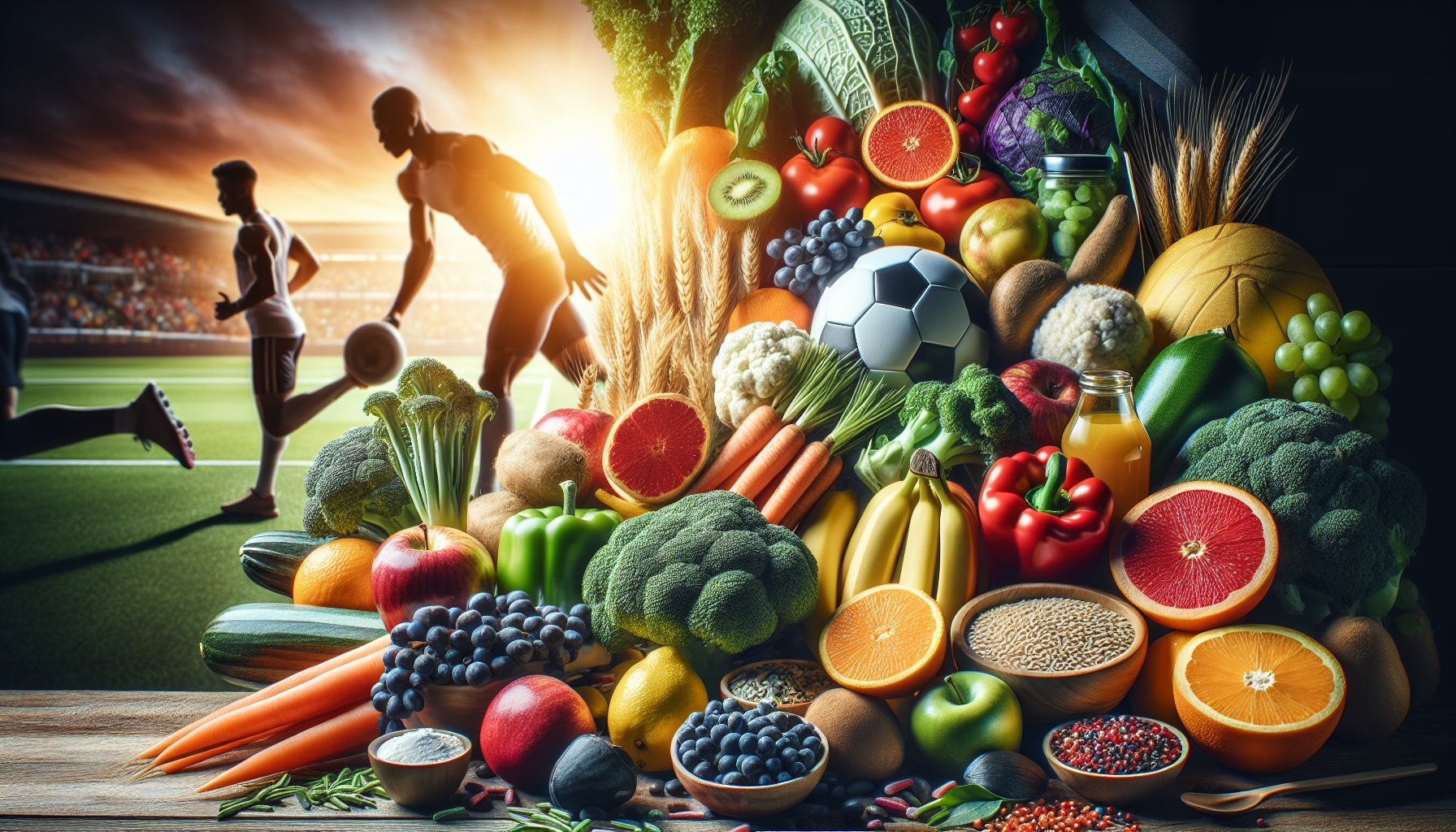You are about to discover the key to unlocking your full athletic potential: nutrition. In this article, we will explore the powerful impact that diet can have on your athletic performance. Whether you’re a professional athlete or a weekend warrior, understanding how to fuel your body properly can make all the difference. From the importance of macronutrients to the role of hydration, we will delve into the essential components of an athlete’s diet. Get ready to take your game to the next level by maximizing your athletic performance through nutrition.
Maximizing Athletic Performance through Nutrition
Welcome to this comprehensive guide on maximizing athletic performance through nutrition! In this article, we will explore the crucial role that nutrition plays in enhancing athletic performance. We will delve into topics such as understanding individual dietary needs, macronutrients and micronutrients, hydration, pre-workout and post-workout nutrition, supplements for performance enhancement, and strategies for preventing nutrition-related issues.
Understanding the Role of Nutrition in Athletic Performance
Proper nutrition is essential for athletes to perform at their best. It provides the necessary fuel and nutrients to support stamina, strength, endurance, and overall performance. The food we consume serves as the building blocks for our bodies, providing energy, repairing tissues, and aiding in recovery. Understanding how nutrition impacts athletic performance can help athletes optimize their diets for better results.
Determining Individual Dietary Needs
Every athlete has unique dietary needs based on factors such as their sport, training intensity, body composition, and goals. It’s crucial to work with a sports nutritionist or dietitian to determine the specific dietary requirements for optimal performance. These professionals can analyze your individual needs and develop a personalized nutrition plan that suits your goals and enhances your athletic performance.
Macronutrients and Athletes
Macronutrients are the three main components of our diet: carbohydrates, proteins, and fats. Athletes must carefully consider their intake of these macronutrients to support their energy levels, muscle growth, and overall performance.
1. Carbohydrates
Carbohydrates are the primary source of energy for athletes. They provide the fuel needed for intense workouts and help replenish glycogen stores in muscles. It’s important to consume a mix of complex carbohydrates, such as whole grains, fruits, and vegetables, to ensure a steady release of energy during physical activity.
2. Proteins
Proteins play a crucial role in muscle repair, growth, and recovery. Athletes require an increased protein intake to support their muscle development and repair damaged tissues post-workout. Good sources of protein for athletes include lean meats, poultry, fish, eggs, dairy products, and plant-based sources like legumes, tofu, and quinoa.
3. Fats
Contrary to popular belief, dietary fats are an essential part of an athlete’s diet. Fats provide energy, support hormone production, aid in nutrient absorption, and contribute to overall health. Healthy fat sources include avocados, nuts, seeds, olive oil, and fatty fish like salmon. Athletes should aim for a balanced intake of healthy fats while avoiding excessive saturated and trans fats.
Micronutrients and Athletes
In addition to macronutrients, athletes must pay attention to their intake of micronutrients – vitamins and minerals that are essential for various bodily functions.
1. Vitamins
Vitamins such as vitamin A, vitamin C, vitamin D, and vitamin E play essential roles in immune function, energy production, and overall health. Athletes must ensure a varied and balanced diet that includes a wide range of fruits, vegetables, and whole grains to obtain an adequate supply of vitamins.
2. Minerals
Minerals like iron, calcium, magnesium, and zinc are important for optimal athletic performance. Iron is crucial for oxygen transport and preventing fatigue, while calcium supports bone health. Magnesium aids in muscle function and recovery, and zinc contributes to immune function. Athletes must include mineral-rich foods such as leafy greens, dairy products, nuts, seeds, and lean meats in their diet.
Hydration and Electrolyte Balance
Proper hydration is vital for athletes as even mild dehydration can significantly impact performance. Hydration needs vary depending on factors such as climate, intensity of exercise, and individual sweat rate. Athletes should hydrate well before, during, and after workouts, as well as maintain electrolyte balance by consuming fluids that contain sodium, potassium, and magnesium.
Pre-Workout Nutrition
Fueling your body with the right nutrients before a workout can improve performance and enhance endurance. Proper pre-workout nutrition helps maximize energy levels, optimize muscle strength, and minimize muscle damage.
1. Fueling the Body for Optimal Performance
Carbohydrates should be the focus of pre-workout meals and snacks. Consuming easily digestible carbohydrates like a banana, oatmeal, or a sports drink about an hour before exercise can provide a quick source of fuel for the muscles. Including a small amount of protein, such as a Greek yogurt or a protein shake, can also aid in muscle recovery and provide sustained energy.
2. Importance of Timing and Macronutrient Ratios
Timing is crucial when it comes to pre-workout nutrition. It’s best to consume a meal or snack containing carbohydrates and protein around 1-3 hours before exercise to allow for proper digestion. The ratio of carbohydrates to protein will depend on factors such as the duration and intensity of the workout. Experimenting with different ratios and monitoring how your body responds is key to finding what works best for you.
Post-Workout Nutrition
Effective post-workout nutrition is crucial for muscle recovery, growth, and replenishing energy stores. Consuming the right nutrients in the proper timing can enhance muscle repair, reduce soreness, and improve overall recovery.
1. Muscle Recovery and Growth
Protein is the star of post-workout nutrition as it aids in muscle repair and growth. Consuming high-quality protein sources within the first few hours after a workout is crucial. Foods like lean meats, eggs, cottage cheese, or a protein shake can provide the necessary amino acids to repair damaged muscles.
2. Nutrient Timing for Effective Recovery
Timing is vital for post-workout nutrition. The muscles are most receptive to nutrient absorption immediately after exercise. Consuming a combination of carbohydrates and protein within 30 to 60 minutes after a workout can enhance glycogen replenishment and muscle repair. Including antioxidant-rich foods like berries or dark leafy greens can also help reduce inflammation caused by intense exercise.
Supplements for Performance Enhancement
While proper nutrition should be the foundation of athletic performance, certain supplements can complement an athlete’s diet to enhance performance and aid in recovery.
1. Understanding the Role of Supplements
Supplements are intended to supplement, not replace, a balanced diet. They are not magic pills but can be useful in specific situations where nutrient needs may not be met through regular food consumption.
2. Commonly Used Sports Supplements
Creatine, protein powder, branched-chain amino acids (BCAAs), and caffeine are among the most commonly used sports supplements. Creatine can enhance strength and power, protein powder aids in muscle recovery and growth, BCAAs may reduce muscle breakdown during exercise, and caffeine can improve performance and delay fatigue.
3. Risks and Considerations of Supplement Use
While some supplements can be beneficial, it’s essential to understand the risks and consider individual factors before use. Not all supplements are safe or effective, and some may have side effects or interact with medications. Athletes should consult with a healthcare professional or sports nutritionist before incorporating supplements into their regimen.
Preventing Nutrition-Related Issues and Enhancing Performance
In addition to optimizing nutrition for performance enhancement, it’s crucial to address other aspects that can impact athletic performance.
1. Addressing Weight Management
Maintaining a healthy weight is important for optimal performance. Athletes should focus on a balanced approach to weight management that includes proper nutrition, regular exercise, and working with a qualified professional to establish a healthy weight range.
2. Optimizing Gut Health
Gut health plays a significant role in nutrient absorption, immune function, and overall well-being. Athletes should focus on consuming a diet rich in fiber, probiotics, and prebiotics to support a healthy gut. Avoiding excessive intake of sugary and processed foods can also promote gut health.
3. Recognizing and Combating Fatigue
Fatigue can impact an athlete’s performance and hinder progress. Adequate rest, recovery, and proper nutrition are key in combating fatigue. Paying attention to sleep quality, managing stress levels, and consuming nutrient-dense foods can all help reduce fatigue and optimize performance.
4. Strategies for Promoting Immune Function
A strong immune system is crucial for athletes to avoid illness and maintain consistent training schedules. Proper nutrition, regular exercise, adequate sleep, stress management, and minimizing exposure to germs can all contribute to a healthy immune system.
By understanding the role of nutrition in athletic performance, determining individual dietary needs, and implementing strategies to optimize nutrition, athletes can enhance their performance, promote recovery, and prevent nutrition-related issues. Remember to work with professionals to develop a personalized nutrition plan that suits your specific needs and goals. With proper nutrition as the foundation, you can unlock your athletic potential and maximize your performance. Happy training!

